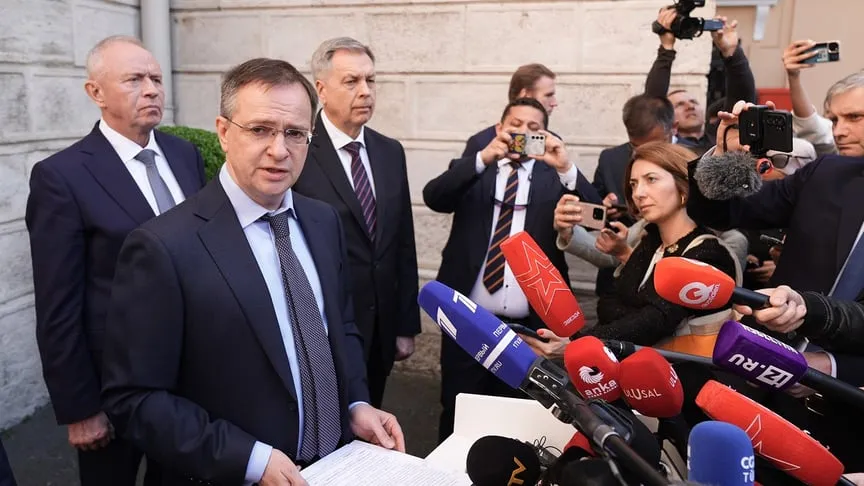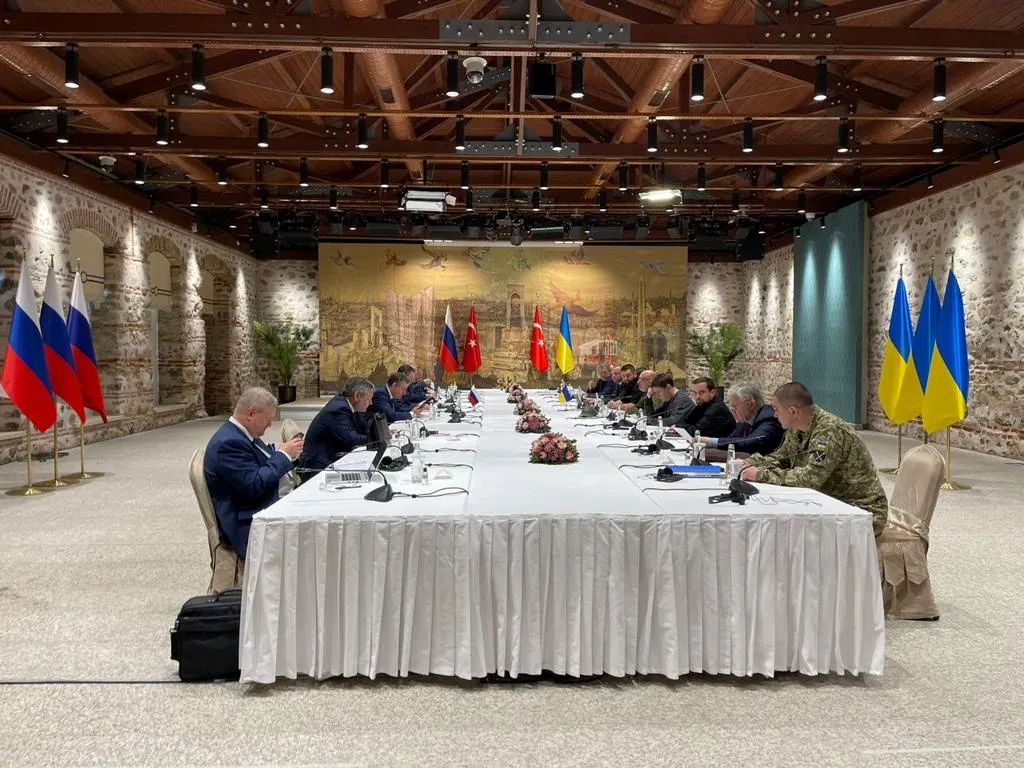ISTANBUL — In the majestic halls of the Dolmabahçe Palace, where once the fate of empires was decided, a new drama is unfolding today: peace negotiations between Ukraine and Russia, the first in three years, are drowning in chaos carefully orchestrated by the Kremlin. Hundreds of journalists buzzing like a hive near the Bosphorus, diplomats hurriedly rewriting plans, and leaders balancing on the edge of hope and disappointment — all this seems to play into Moscow’s hands. As CNN’s chief international security correspondent Nick Peyton Walsh reports from Kyiv, “The Kremlin got exactly what it wanted, and the White House appears to be able to do little about it.”
 Photo: Getty Images
Photo: Getty Images
Chess on the Bosphorus: Putin Holds a Pause
The world held its breath for three days, waiting to see whom Russia would send to Istanbul. President Vladimir Putin’s refusal to personally participate in the negotiations he proposed was not just a diplomatic maneuver but a masterstroke that left everyone in suspense. Instead of himself, Putin sent a second-tier delegation headed by Kremlin aide Vladimir Medinsky, whom Ukrainian President Volodymyr Zelensky called “decorative.” “This isn’t negotiations, it’s a performance,” Zelensky stated in Ankara, standing next to Turkish President Recep Tayyip Erdoğan, whose neutrality in this war is increasingly cracking.
Putin’s decision, which analysts describe as “a well-calculated risk,” worked flawlessly. U.S. President Donald Trump’s response was exactly what the Kremlin expected: “Nothing will happen until I meet with Putin.” These words, spoken aboard Air Force One en route to Abu Dhabi, dashed weeks of diplomatic efforts and shifted the focus to a hypothetical bilateral meeting between U.S. and Russian leaders. “Putin has a blank check,” Walsh notes. “He can buy time until Trump takes the next step.”
According to insider information, frustration is mounting in the White House corridors because Trump seems to allow Putin to dictate the pace. Sources close to the administration say that Trump is considering a meeting with Putin in the near future, possibly on neutral territory like the Persian Gulf. But there is no urgency for Moscow. Having tested the limits of threats with “strong sanctions” from France and other European allies of Ukraine, Putin is convinced: the West is divided, and Trump is his best trump card.
Zelensky in a Trap: Gesture for Trump
For President Zelensky, Istanbul became a test of political acrobatics. His decision to send a delegation led by Defense Minister Rustem Umerov to Turkey was motivated less by confidence in the success of negotiations and more by the necessity to maintain Trump’s support. “Kyiv must demonstrate readiness for any steps for peace,” Walsh writes, “otherwise pro-Kremlin voices among Trump’s circle will intensify, and support for Ukraine may diminish.”
This is delicate balancing. Zelensky, who arrived in Ankara for a meeting with Erdoğan, deliberately avoided Istanbul so as not to appear as waiting for Putin’s mercy. But his presence in Turkey is a signal to Trump: Ukraine is ready to play by his rules, even if it means participating in negotiations with a “decorative” Russian delegation. “This is a gesture of respect to President Trump,” Zelensky openly declared, emphasizing that his main goal is to keep the U.S. in the game.
However, this strategy carries risks. In Kyiv, according to sources close to the Presidential Office, there is growing concern that concessions in rhetoric or the format of negotiations could be perceived as weakness. The Ukrainian delegation in Istanbul received a clear mandate: to insist on a 30-day ceasefire, the return of children abducted by Russia, and full prisoner exchanges. But without Putin’s participation, these demands sound like a cry into the void.
Chaos as a Weapon: The Kremlin Plays on Nerves
CNN journalist Claire Sebastian, reporting from Istanbul, describes the scene near Dolmabahçe Palace as “a theater of the absurd.” Two hundred journalists, dozens of cameramen, and no clarity: who will come, when, and whether negotiations will even begin. “Expecting the best rather than knowing the outcome,” cynically remarked Stanislav Ivashchenko, correspondent for the Russian publication Zvëzda, referencing war weariness but also emphasizing Moscow’s unwavering stance.
This chaos is not accidental but strategic. Putin, having proposed negotiations in Istanbul after the West’s ultimatum for a 30-day ceasefire or new sanctions, chose the “third way,” which allows him to maintain control. Resuming talks at the same location and with the same people as in 2022 is not just symbolism but a signal: Russia will not concede. “Putin is in no rush,” Sebastian notes. “He keeps everyone on edge as his forces advance in Donbas.”
The Russian delegation, led by Medinsky, has no authority for serious decisions, which deepens skepticism. “We came for serious talks, but the Russians are making demands,” an anonymous Ukrainian diplomat stated, accusing Moscow of stalling. The Kremlin, in turn, blames Kyiv for “theatricality,” creating a smoke curtain that hides its own manipulations.
Trump and Putin: The Dance of Two Leaders
At the center of this chaos is Donald Trump, whose unpredictability adds volatility to the negotiation process. His statements that “nothing will happen” without his meeting with Putin not only play into the Kremlin’s hands but also put Ukraine in an uncomfortable position. “Trump wants an agreement he can sell as a victory,” a State Department source explains, “but he underestimates how long Putin intends to play the long game.”
Russia, on its part, is closely monitoring every word Trump utters, hoping for a reset in relations. Diplomatic circles report that Moscow expects Trump, irritated by slow progress, might make concessions, such as recognizing the annexation of Crimea or freezing the front line. For now, the U.S. president maintains suspense, sometimes hinting at a trip to Istanbul and other times saying he will return home.
For Ukraine, each day of this diplomatic dance is a test. Zelensky, who a month ago publicly argued with Trump in the Oval Office, now has to demonstrate loyalty to maintain U.S. support. But in the eyes of Ukrainians, who hear air raid sirens every day, these negotiations increasingly resemble a game where Kyiv is not a player but a stake.
What Comes Next?
While Dolmabahçe Palace remains the arena of diplomatic maneuvers, and the Bosphorus reflects the world's tension waiting for a result, one thing is clear: the Kremlin has taken the initiative. Putin, keeping everyone in uncertainty, strengthens his positions, while Ukraine is forced to prove its readiness for peace before the only audience that matters — Donald Trump. Whether the Trump-Putin meeting will be a breakthrough or just another act in this game depends on who tires first: the White House or the Kremlin. But as one Turkish diplomat ironically noted, “Stambul has once again become the city where we all wait for Gogo.”



